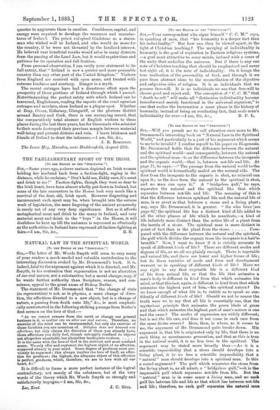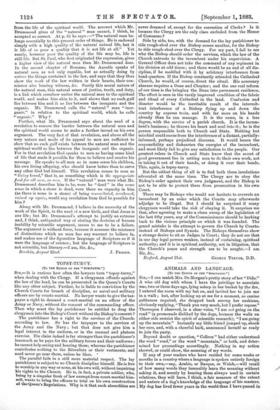[To THE EDITOR OF THE " SPECTATOR:1 SIR, — Will you permit
me to call attention once more to Mr. Drummond's interesting book on "Natural Law in the Spiritual World," and particularly to a part of his argument which seems to me to be invalid P I confine myself to his paper on Biogenesis. Mr. Drummond holds that the difference between the natural and the spiritual world—and consequently, between the natural and the spiritual man—is as the difference between the inorganic and the organic world,—that is, between not-life and life. At page 71, he says :—" The passage from the natural world to the spiritual world is hermetically sealed on the natural side. The door from the inorganic to the organic is shut, no mineral can
open it ; so the door from the natural to the spiritual is shut, and no man can open it." A " bridgeless gulf," he says, separates the natural and the spiritual like that which separates between not-life and life. The meaning of this is that the difference between spiritual life and the natural life of man, is as great as that between a stone and a living plant ; nay, says Mr. Drummond, it is greater. "Ha who lives [see page 82] the spiritual life has a distinct kind of life added to all the other phases of life which he manifests,—a kind of life infinitely more distinct than the active life of a plant from the inertia of a stone. The spiritual man is more distinct in
point of fact than is the plant from the stone Corn.. pared with the difference between the natural and the spiritual, the gulf which divides the organic from the inorganic is a hair's- breadth." Now, I want to know if it is strictly accurate to speak of different kinds of life ? There are different modes and degrees of life, as we all see plainly enough. There is vegetable and animal life, and there are lower and higher forms of life ; but do these varieties of mode and form and development warrant us in speaking of different kinds of life P Have we any right to say that vegetable life is a different kind of life from animal life, or that the life that animates a man's body is different in kind from that which animates his mind, or that this last, again, is different in kind from that which animates the highest part of him,—his spiritual nature? Do we know enough of what life is, to entitle us to speak so con- fidently of different kinds of life? Should we not be nearer the truth were we to say that all life is essentially one, that the mysterious principle that animates the green blade of grass and that which animates the highest part of man's nature is one and the same ? The modes of expression are widely different; but is not the life one, and does it not come in each case from the same divine source ? Here, then, is where, as it seems to me, the argument of Mr. Drummond quite breaks down. His argument is, that life is originated only by life, that there is no such thing as spontaneous generation, and that as this is true in the natural world, it is no less true in the spiritual. The argument may be stated more broadly thus :—As it is a scientific impossibility that a stone should develope into a living plant, it is no less a scientific impossibility that a " natural " man should develope into a spiritual man. Is this a sound argument ? The gulf which separates the stone from the living plant is, as all admit, a " bridgeless gulf,"—it is the impassable gulf which separates not-life from life. But the " natural " man is in some sense a living man, and no snob gulf lies between life and life as that which lies between not-life and life; therefore, no such gulf separates the natural man from the life of the spiritual world. The account which Mr. Drummond gives of the " natural " man cannot, I think, be accepted as correct. At p. 82 he says :—" The natural man be- longs essentially to this present order of things. He is endowed simply with a high quality of the natural animal life, but it is life of so poor a quality that it is not life at all." Yet surely, however poor the quality of the life may be, life is still life. But St. Peal, who first originated the expression, gives a higher view of the natural man than Mr. Drummond does. In the second chapter of Romans, the Apostle speaks of natural men as not only capable, but as actually doing by nature the things contained in the law, and says that they thus show the work of the law written in their hearts, their con- science also bearing witness, &c. Surely this moral nature of the natural man, this natural sense of justice, truth, and duty, is a link which somehow unites the natural man to the spiritual world, and makes him akin to it, and shows that no such gulf lies between him and it as lies between the inorganic and the organic. Mr. Drummond calls the " natural " man "inor- ganic," in relation to the spiritual world, which he calls "organic." Why ?
Further, what Mr. Drummond says about the need of a revelation to remove the barrier between the natural man and the spiritual world seems to make a further inroad on his own argument. The very fact of that revelation, and above all the very nature and mode of its appeal to men are sufficient to show that no such gulf exists between the natural man and the spiritual world as lies between the inorganic and the organic. For in that revelation God speaks to men as having some kind of life that made it possible for them to believe and receive his message. He speaks to all men as in some sense his children, his own living offspring, who should know better than to serve any other God but himself. This revelation comes to men as "living bread," that is, as something which is the appropriate food for all men, as men. If the "natural" man were what Mr. Drummond describes him to be, were he " dead " in the same sense in which a stone is dead, were there no capacity in him (as there is none in a stone) of being resuscitated, awakened, raised up again, would any revelation from God be possible for him ?
Along with Mr. Drummond, I believe in the necessity of the work of the Spirit, in the need of a new birth, and that Jesus is our life ; but Mr. Drummond's attempt to justify an extreme and, I think, antiquated way of stating the doctrine of human inability by scientific argument, seems to me to be a failure. The argument is without force, because it assumes the existence of distinctions which no man has any warrant to believe in, and makes use of the figurative language of Scripture as if it were the language of science ; but the language of Scripture is not scientific, but literary.—I am, Sir, &c.,
Brechin, August 22nd. J. FRASER.



































 Previous page
Previous page